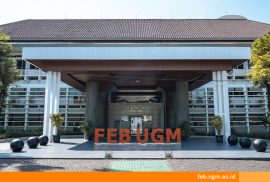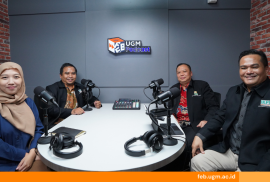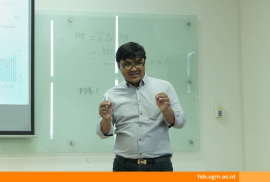The development of artificial intelligence (AI) technology has had a significant impact on various industries, including accounting. AI is a technology that enables machines to mimic human behavior and decision-making. In accounting, AI automates routine tasks such as data entry, bookkeeping, and reconciliation, improving the efficiency and accuracy of financial reporting.
Yuni Yuningsih, CPA, M.Com., Ph.D., lecturer and researcher at the School of Accounting, Economics, and Finance, Faculty of Business and Law, Curtin University, Australia, shared this during a public lecture titled “The Impact of Artificial Intelligence (AI) on the Accounting Profession,” held on September 2, 2024, at the Drs. Soekamto, M.Sc., Auditorium, Master’s Program in Accounting, FEB UGM.
Yuni mentioned that AI is also crucial in identifying trends and anomalies in data, helping accountants comply with regulations, and providing deep insights. This has led to a shift in the role of accountants within institutions or companies. Accountants are now more involved in strategic analysis, whereas previously, their role focused on manual data processing. The presence of AI also encourages accountants to adapt and acquire new skills, such as understanding specific AI tools, including machine learning algorithms and data analysis techniques like regression analysis, to support informed decision-making.
Yuni noted that several large firms, such as PwC, EY, and KPMG, have integrated AI into their financial operations. PwC, for example, uses AI for risk assessment and financial audits. EY uses AI for tax preparation and advisory services. Meanwhile, KPMG is integrating AI into client management and financial reporting.
Although AI can automate many tasks, Yuni noted that AI cannot fully replicate the ethical decision-making abilities of humans. In addition, clients will continue to value the personal touch and trust built through human interaction. The presence of AI in accounting does not mean that it will replace the accounting profession, but rather serve as a tool to enhance the performance of accountants.
At the end of her presentation, Yuni emphasized the need for adaptation in the AI era, including in accounting education. Curriculum adjustments are necessary to prepare future accountants, including the integration of data literacy, analytics, and technology management into accounting programs. In addition, an emphasis on lifelong learning is crucial so that accountants can stay current with advancements in AI technology.
Reportage: Kurnia Ekaptiningrum
Sustainable Development Goals (SDGs)








